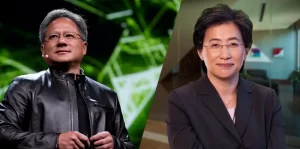Introduction:
In the fast-paced world of semiconductor technology, competition is fierce, and innovation is paramount. Intel, a renowned name in the tech industry, has set its sights on the global wafer foundry market, aiming to secure the second position by 2024.
To achieve this goal, Intel plans to surpass Samsung, a formidable competitor in the semiconductor arena.
In a recent event, Intel unveiled its groundbreaking 1.8-nanometer Intel 18A node wafer prototype, showcasing its determination to lead in advanced semiconductor processes.
Follow us on Linkedin for everything around Semiconductors & AI
Intel Innovation 2023:
On the 19th of this month, Intel hosted the Intel Innovation 2023 event in San Jose, California, where it unveiled its latest breakthroughs.
The highlight of the event was the release of the first 1.8-nanometer Intel 18A node wafer prototype and the announcement of the Panther Lake series processors under the Intel 18A process, set to release in 2025.
Read more: 5 Key Announcements From Intel Innovation Day
Pat Gelsinger’s Vision for Intel Foundry:
Pat Gelsinger, CEO of Intel, assumed leadership in 2021 and set ambitious goals for the company. Within four years, Intel aims to achieve five advanced process milestones, including the 10-nanometer Intel 7, 7-nanometer Intel 4, 4-nanometer Intel 3, 2-nanometers Intel 20A, and 1.8-nanometer Intel 18A.
As of now, Intel has successfully completed the Intel 4 process and is on track with the preparation for Intel 3, slated for completion by year-end.
Read more: Intel foundry is doomed to Fail: TSMC Director
The Race to Surpass Samsung for Intel Foundry:
Intel’s strategy involves challenging Samsung, a dominant player in the advanced semiconductor process market. Samsung, having achieved mass production of the 3-nanometer process, plans to advance to the 2-nanometer process by 2025, with a focus on mobile products. However, Intel’s aggressive timeline positions it to leapfrog Samsung in the advanced semiconductor process by initiating mass production of the 1.8-nanometer products in 2025.
Challenges and Advantages for Intel Foundry:
However, despite Intel’s determination and technical prowess, challenges persist. Yield issues and quality concerns, notably seen in the Intel 7nm process, have been persistent hurdles. Conversely, Samsung holds an advantage in yield, leveraging their expertise in GAA technology. While Intel’s plan to adopt RibbonFET technology similar to GAA for Intel 20A products holds promise, it needs time for yield improvement, potentially creating a gap in competition with Samsung.
Conclusion:
Intel’s drive with the 1.8-nanometer Intel 18A process shows their determination to lead in the advanced semiconductor market. The race for second place against Samsung is heating up, bringing promise of exciting advancements. The world is eagerly anticipating the impact of these technologies on the tech landscape.




